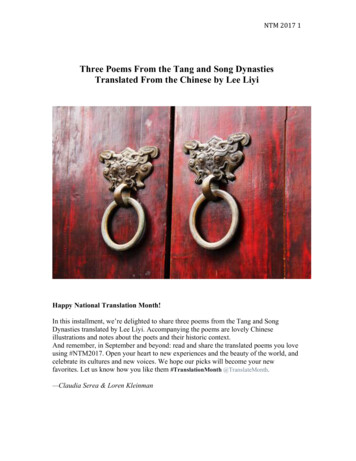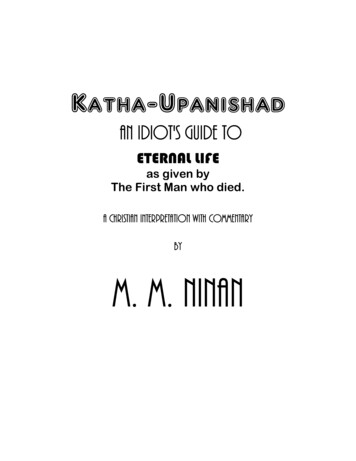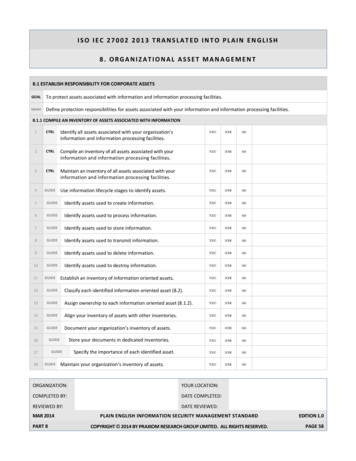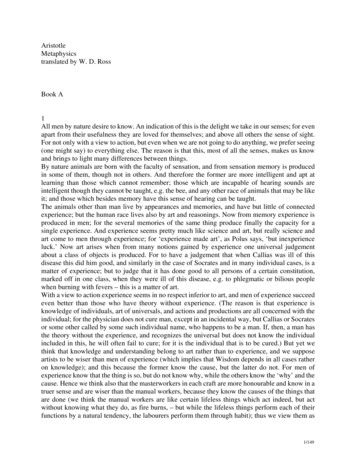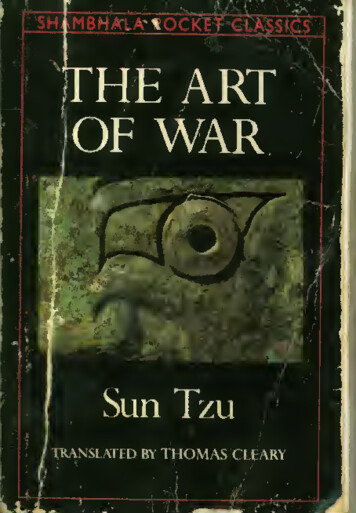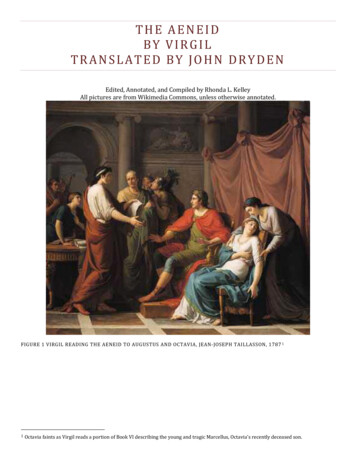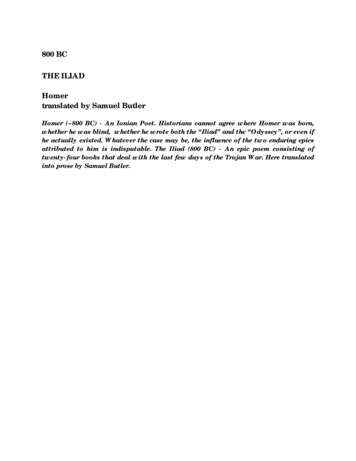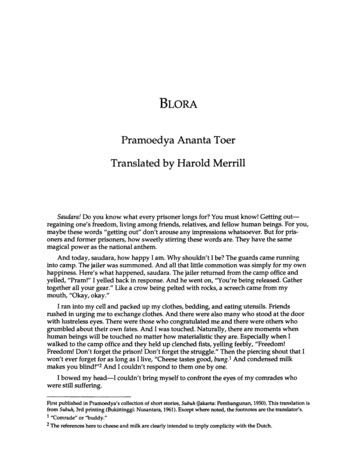
Transcription
BLORAPramoedya Ananta ToerTranslated by Harold MerrillSaudara! Do you know what every prisoner longs for? You must know! Getting out—regaining one's freedom, living among friends, relatives, and fellow human beings. For you,maybe these words "getting out" don't arouse any impressions whatsoever. But for prisoners and former prisoners, how sweetly stirring these words are. They have the samemagical power as the national anthem.And today, saudara, how happy I am. Why shouldn't I be? The guards came runninginto camp. The jailer was summoned. And all that little commotion was simply for my ownhappiness. Here's what happened, saudara. The jailer returned from the camp office andyelled, "Pram!" I yelled back in response. And he went on, "You're being released. Gathertogether all your gear." Like a crow being pelted with rocks, a screech came from mymouth, Okay, okay."I ran into my cell and packed up my clothes, bedding, and eating utensils. Friendsrushed in urging me to exchange clothes. And there were also many who stood at the doorwith lustreless eyes. There were those who congratulated me and there were others whogrumbled about their own fates. And I was touched. Naturally, there are moments whenhuman beings will be touched no matter how materialistic they are. Especially when Iwalked to the camp office and they held up clenched fists, yelling feebly, "Freedom!Freedom! Don't forget the prison! Don't forget the struggle." Then the piercing shout that Iwon't ever forget for as long as I live, "Cheese tastes good, bung.1 And condensed milkmakes you blind!"2 And I couldn't respond to them one by one.I bowed my head—I couldn't bring myself to confront the eyes of my comrades whowere still suffering.First published in Pramoedya's collection of short stories, Subuh (Jakarta: Pembangunan, 1950). This translation isfrom Subuh, 3rd printing (Bukittinggi: Nusantara, 1961). Except where noted, the footnotes are the translator's.1"Comrade" or "buddy."2 The references here to cheese and milk are clearly intended to imply complicity with the Dutch.
52Pramoedya Ananta ToerThe first iron door was opened. I passed through. Then the door was locked again. Andbehind this two-meter high barrier, my comrades followed me with dull eyes. I handed overmy inventoried gear. And everything I was carrying was searched. What was there to behad from me? Only the clothes that I was wearing, one other set, and a few books. Then Ireceived a letter of discharge that had this stamp at the bottom: "de facto krijgsgevangenenkamp//3 And I almost made another mistake. I smiled reading those words. A sharp glarelocked up my smile.For a moment I gazed at my comrades who stuck their noses between the iron bars.I passed through the second iron door. My comrades behind the door still held up theirfists. And the lustreless eyes became fiery yelling out, "Freedom! Freedom!"I arrived at the third door. Once again I looked back. Then my comrades disappearedfrom sight. On my back hung a bag made of canvas. I had made this bag in the camp,stealing the materials when I was subjected to forced labor at the military repairshop. Itcontained one pair of short pants, one book by Steinbeck, one book by Weststrate, one bookby Exupery and Tagore, and a book of French lessons that I never once picked up—all mywealth! And the third door was locked behind me.And once more I looked back. Oh! Secure box. For nearly two years I had been cagedinside that box. No, saudara—I couldn't bear to look again. I walked slowly. And all of asudden my heart became terribly sad. I used to believe that sadness only arises whenpeople's passions are not satisfied. But this time, on the contrary, I became sad as my desireswere satisfied—in a big way! This world is full of secrets! And in my ears rang the shouts ofmy friends, which always rang out to compatriots who were released. "Well, what a flood inthe night this is!" And I became even sadder.Now I saw the sun freely again. Saw the hustle and bustle freely, too. Everything I laidmy eyes on was completely free. And I really felt that what a person sees depends upon thestate of his heart.Saudara, you know what I did after that? Here's what happened first: I ate sate at PasarJatinegara—as much as I could hold. And I paid the bill with a pair of shorts. My seconddesire was satisfied. Then this: I went to a jeweler's and sold my wedding ring. I had nochoice, saudara. If a ship is hit by a storm, a person can't feel sentimental about losing themainmast. After that, the books that I loved floated away too. And finally, I went to theticket window. Bought a ticket. Hopped on a train. I traveled, saudara—heading towardsthe town of my birth: Blora!I myself don't understand, saudara, why this time the train ran so fast. And what Iremember now: the sea! The sea, saudara. It had been a long time since I had seen the sea.And suddenly the open sea spread out from the train window. Only for two minutes.Then forest followed. Once again the sea appeared with boats, silvery on a blue background. But only for five minutes. The train headed again into the interior. Semarang! HereI had once stood in line for a ticket for two days and two nights. But now I didn't have toanymore. Because the Japanese had already been sentenced to death and strung upeverywhere. They who had lost the war.Many towns were in ashes and the broken roadways had to be connected with boatlinked bridges. And I became even more confused as to why the trip went so fast. And* "de facto prisoner-of-war camp."
Blora53Blora—a moment later we arrived. In the past, I always used to hear the hissing of enginesand shaking of wheels against the tracks. But now it just ran calm and fast.Blora! Just the sound of it felt sweet to my senses. Saudara, you would be like that too iffor years you hadn't set foot in the land of your own birth. And the land where the parentsand relatives whom you love are. But feelings, saudara—just like the hinterlands—have nolasting security! Because fear came churning into my marrow. Maybe my whole family was4already dead. Killed by Muso's Communists or by the TNI or by the Dutch. Who it was thatdestroyed the family was not something to bother my head about. It was the catastropheitself that I was scared of. And another fear was this: the mop-up campaigns that were justas horrible as mop-up campaigns anywhere—and guerrilla movements like other guerrillamovements anywhere. Both of them are equally violent. And now it was definitely wartime.It's really like this, saudara', sometimes people get sick of security and want war. When warhas broken out, people get bored with it and want peace again. Just like you, saudara, whenyou get sick of a lover who's always complaining and asking for money. But if your lover'sgone, you long to have her sitting next to you. Perhaps that's just the way human nature is.And in all matters, too.Blora, saudara. Blora! Have you ever been to Blora? That town that is so famous for itspoverty? Later on I'll tell you about it. But now, the stony Mount Kendeng has appeared.Harsh, saudara. Like the carcass of a giant that has begun to turn yellow. And the smell of it,saudara! A smell that bothers the people who live there. The smell—poverty. And it's like atradition here—people have to live poor. Because here, saudara, people who are able to buymeat once a week aren't considered common folk any longer but are already said to be"ttA ro."5But butchers aren't included in this category.Blora, saudara!! And I had arrived. And just here my story begins. At first what I sawwas this: the ruined station. And this had been demolished by Amir's forces,6 when theywere attacked by the TNI. In front of the station stood rows of buildings owned by Chinese.All of these, too, had been completely demolished. Demolished by American bullets. But Ididn't care who had done it.The passengers lined up to go outside. And at the exit I saw Inah. You don't know Inahyet, saudara. She was the most beautiful girl in my kampung. And also the most arrogant.You know why she was arrogant, too. Because she was terribly pretty and she rejected myproposal. Yes, she answered my letter. But her response, saudara, was advicel Nothing butadvice, that's all! It really stung. But now she wasn't Miss Pretty like before. She had gonesoft and her body was frail. The white powder on her face was thick and her lips were as redas a cock's comb. Her hair was thin, her eyes wild, and her behavior flirtatious."Mas," she greeted me.And I bowed my head. You yourself know the reason, don't you? I was afraid of herasking me to marry her. And I just walked on in silence. And she called again. And Iplugged my ears. And she kept calling. I quickened my pace.4Tentara Nasional Indonesia, or Indonesian National Army5 Ndoro refers to the Javanese aristocratic class. Amir Sjarifuddin was Minister of Defense and later Prime Minister of the Indonesian Republic before joiningMusso in opposition to the Sukarno government. He was a leader of the Socialist Party (PS) in the early Republican period and organized some of the revolutionary youth factions (badan peήuangaή) that were active againstthe incoming Dutch forces. During this period, there was often fierce competition at the local level, particularlyin Central Java, between the Indonesian Army and the badan perjuangan as well as other armed groups.
54Pramoedya Ananta ToerThe flat bag still rubbed up and down on my back. And the only other thing I wascarrying was a red half rupiah note. Suddenly she roared with laughter. The bitch! I wasbeing laughed at. And suddenly, too, I got angry. I stopped. Turned my body around. Andshe was already being fondled by a soldier of the occupation. My anger disappeared,dissolved, oh! This was a liberated region that was being liberated.For a moment I sat on some rocks watching my old heart-throb's behavior. She wriggledwith pleasure. And the soldier sat, not daring to stand, his hands groping at whatever partsof my old heart-throb's body could be touched. Saudara, whether or not the sun was outthat day is not what determined the truth. What happened, that's what was true. And foronce truth unfolded in broad daylight: my old heart-throb was being fondled by a soldier.It occurred to me to carry her away—to join in helping guide her back to the world ofgoodness. So I stood up. Began walking. Approached slowly. And she was still tangled upin the fondling embrace of the cat-eyed soldier. Her loud laughter faded. Her happywriggling faded. And her dimmed eyes stared at me—dripping tears. She struggled hard tofree herself from his embrace. I moved closer. I was overcome with emotion. I held her handtightly. I pulled to tear Inah away from the soldier's control. As a result of my concern, I gota kick in the groin.In pain I left sheepishly. I was willing to bet, a three day ordeal and only then would thepain from that kick go away. I went back to the rocks I had been sitting on. I watched Inahstill struggling. Her eyes were focused on me. Eyes that begged for sympathy. Eyes thatconveyed words about the course of her life after I had left her. I am a woman who sellsherself willingly? And those eyes said, "Don't blame me for becoming like this."Suddenly Inah was pulled to his chest. Her legs were lifted up. And she struggledharder. She realized her own predicament—the battlefield of a life that she hated, but thatshe had to enter. And the soldier's chest was covered by Inah's body. He walked to his jeep.A faint cry could still be heard, "Mas— Mas—." Then the cry disappeared, drowned out bythe roar of the engine. And I kept imagining Inah, who was so frail, with tears flowing. Aquestion suddenly came to me, saudara. Who is it that actually owns a human life? Clearlyhumans don't own human life! Clearly humans don't own their own lives. And who was itthat owned Inah's life? I was not able to answer, saudara. Everywhere prison air weakensthe stamina to think. Answer for yourself, saudara.I followed the jeep with my eyes until it disappeared down onto the Lusi River bridge. Istood up. Slowly went off in the direction of the jeep. A strong desire to find my home andfamily returned.Military vehicles went back and forth. Also bullock carts that I used to see when I was achild. And the ruins of stone houses. And the embers of houses. And naked childrenroaming about with bloated stomachs. And beggars. The condition of a free territory thathad just been occupied. And everywhere it was just the same. A dead town—a town thathad no young men.Suddenly there was someone calling me: "Agus, Agus."7 And I was facing a dwarfishold woman whose face was all wrinkled. "Agus," she called again slowly and I was huggedwith aged strength. And with a lump in her throat she cried, "You are still alive, Gus? Iknew you were still alive."' Javanese term of address used by an elderly person speaking to a younger male. As is seen below, "Agus" iscommonly shortened to "Gus."
Blora55And again I was overcome with emotion. Because I was moved. Still more moved by thestink of my own clothes. Part of me was also remembering Inah. But not completely. Andbelow my eyes: white hair, dissheveled and foul-smelling. Her face was buried in my chest.The nape of her neck was full of scabies and on her right shoulder a pineapple-fiber stringwas visible—tied at the bottom to a palm-leaf sack. She was a beggar, saudara; actually, Idon't want to say beggar because everybody is a beggar either inside or out. But it iscertainly the way of the world that this ugly name is always given to people who can't takecare of themselves. And what's more, saudara, people who don't have money are notpermitted to become members of society. They are called society's trash. The person in frontof me was a beggar—society's trash."Who are you, granny?"81 asked, shrinking back.Her crying intensified. Her grip tightening, I couldn't get free from her grasp. Betweensobs I heard this:"Gus. Gus. You don't care to know me anymore? I am your grandmother."My grandmother! And again I was overcome with emotion. Yes, my grandmother wasas dwarfish as that. I hugged her warmly. At the side of the road near the station. Then wewalked. Just walked. Her hand did not let go of me. And because of her grasp, my oldfemale friends didn't care to know me anymore. That was fine, too. We stopped at thecemetery where Mother was buried. A cemetery that wasn't as well-kept as before. It wascovered over by tall and thick weeds.Together we searched for Mother's grave. Only with great difficulty could we find it.Then we pulled out the grass.If what I had seen so far was this horrible—my heart-throb had become a soldier'ssqueeze, my grandmother had become a beggar, the grave had become a patch of weeds—itwas quite easy to guess what condition my home was in. And you can guess for youself,saudara.As we pulled out the weeds, I remembered the way things used to be, saudara. This: aregiment of the Dutch Indies Army ran for their lives when one Japanese section landed atLasem. Then a fierce battle took place. But what was attacked were the gasoline tanksaround Blora. And the Japanese entered safely. And my mother died two months later.Mother's credulity was that immense; the Dutch were going to promote father to"schoolopziener."9Reality taught her that appointments cannot be made by defeated governments. In thatsame year, month, day, hour, and minute, my youngest sister also followed her to eternity.Mother's grave shared a plot with my younger sister's.With weak hands I wiped off the headstone, which was covered with dry mud, andthere appeared writing in tar which said,"Siti Saida and Sri Susanti."I hate praying. But this time I had to pray and I whispered: "Bw, your son has come."And I imagined my mother musing while she sat under the front awning with her thin hairblowing in the breeze. At that time I was seventeen years old. And I said, "Bu, can I have a8The Indonesian term nenek, while literally meaning "grandmother," is commonly used as a term of address forold women. I have chosen to translate it "granny" to retain the sense of irony that Pramoedya intends when thewoman turns out to be the narrator's real grandmother.9School inspector.
56Pramoedya Ananta Toerring?'' And she responded, "What more do you ask from me? I am just waiting for death,Muk." And a month later Mother died. Since then Γve never asked for anything. Saudara,my younger brothers and sisters and all my relatives call me Muk.Right now I don't want to tell you about the sun that rises and sets pr about rain andstorms. I am tired of that. Right now I want to tell you about a flower—I don't know itsname—the only one that grew on the grave. I picked it. Its color was light blue. A color thatI like. And I stuck that flower on top of the headstone. For quite a while I gazed at it. AndGrandmother just kept quiet. Her hand still clutched my arm.Then we walked on again. Each time we met a soldier of the occupation, I braced myself.If they knew I was a former prisoner and hadn't yet requested permission to come to a newregion, I would certainly be arrested again. Safe—always be safe. The town was quitedeserted. The further we got into the kampung, the more frequently we ran into little kids.7Finally we passed my old school "Budi Utomo/ To pass seventh grade, I had sat on thatbench for ten years. Now, the school was not owned by my father any longer. My father hadput it at the disposal of the Japanese. And no longer was it the name "Budi Utomo" that wasdisplayed there. As times change, conditions change.Grandmother still had a firm grasp on my arm. And her step was very slow. Now wearrived at my old kampung. But now it was someone else's kampung. And each face weencountered in the streets was taut with fear. Looks are cheap, saudara, and lives are threetimes cheaper. And the more bullets that America sent, the lower the price of human lifefell.From a distance, the hedges around my yard loomed up—turned yellow. But the roof ofmy house was gone. And the thought entered my head, the communists were the ones thathad burnt it. My father was anti-communist, I thought. Once I had asked him, "Pαfc, whatwould happen if education in Indonesia were adapted to the education system in Russia?"He answered, "What would happen? Just take Indonesia to Russia and then you'll find outfor yourself." And I shut up. The coconut tree which had always stood behind the kitchenand for years had served to lessen Mother's expenses was now bare, a tall trunk that nolonger had leaves.The road that I passed was of stone. But the world of my childhood had disappeared.There were no more children playing ball in the middle of the road with shirts and rocks asgoal posts. Just silence. The road turned. And if you simply went on you would arrive at thebuffalo path which headed towards the Lusi River. Far down that turn I saw a naked littlekid carrying a "grasshopper catcher" by the wings. And behind him trailed his littlechicken.Only then did my grandmother open her mouth again: "Gus, that's your little brother.""Who?Tjuk?"Iasked.Grandmother nodded. And I called out. And from a distance he watched carefully. Thenran towards me with a limp. In the middle of the road he stopped. Then ran again. I tooquickened my pace. Quickly I picked him up, holding him in my arms. He was only sevenyears old—stark naked."Why are you limping, Tjuk?" I asked.And he cried. I kissed him while we walked. Slowly the child responded. "Father said itwas eaten away by a boil, Mas."
Blora57Grandmother just kept quiet."Mas, Mbakw Kun soaks my foot in salt water every day. Then I can walk a little bit. Butnow I have to limp/7 He sobbed. "Can you make it better, Mas? Did you bring medicine,Mas? Surely you brought medicine." His tears went away. "Once, you came back andbought me a goat. Now that goat is gone, Mas. Mbak Kun said it was eaten by a civet. Areyou going to buy me another, Mas? You will, won't you, Mas!"And my little brother started crying again—he cried like grandmothers do. I wasovercome with emotion again. He's my little brother, isn't he? Don't I have the right to sharein the pain in his one swollen foot? To cheer him up I answered, "Of course." And my littlebrother was quiet."Mas, you've brought medicine now, haven't you? They call me 'the cripple.' I don't likeit, Mas. But they call me that anyway. If you're here, I bet they won't dare to anymore.Right, Mas? They won't dare anymore, right? You'll beat them up for sure, like when youbeat up Mas Lik because he wouldn't bathe. But I always bathe, Mas. You brought medicine,right, Mas?""Yeah, I brought medicine.""I knew it, you must have brought medicine.""What grade are you in, Tjuk?"My little brother started crying again. It was a while before he could answer. "I'm notgoing to school, Mas." He sobbed. "Father says I'm a crybaby. I'm not a crybaby, am I, Mas?I'm not a crybaby, am I?""No," and I kissed him on his face which was wet from tears—a face that was pale."In that case, I can go with you to Jakarta, right? Ride in a car and see Pasar Gambir?Right, Mas? I can go along to Jakarta, right?"Of course you can.""I knew it. Sure I can. Where is your car now, Mas? Taken by the Japanese? I keepasking Father, you haven't come home for such a long time. Father said you were capturedby Nika.11 You weren't captured, were you? You're brave, aren't you?""No, I wasn't captured.""Your car wasn't taken by Nika, was it?""No.""I knew it. Father lied.""You still like to sing, Tjuk?""I'm not allowed, Mas." Suddenly his tears burst forth as hard as they could. And Ibegan kissing him again.10Javanese term of reference for a female, most often who has not yet married and who is roughly the same ageor older than the speaker.1* NICA (Netherlands Indies Civil Administration), the post-war colonial administrative body in occupiedterritories.
58Pramoedya Ananta Toer"Why are you crying, Tjuk? Who says you can't? You used to like singing in ϊhejambutree/7"Mas, they all forbid me to sing/' he sobbed. "And the jambu tree was burnt down.Burnt by the communists, Mas/' He sobbed. "Now you've come. I must be allowed to singagain."My littlest brother Tjuk's eyes beamed."Mas, Mbak Kun said, if I sing Trom the West to the East/ Nika will come from theWest and the East and burn my hurt foot. Not any more now. I can sing again, can't I, Mas?"His last sobs disappeared. With a clear voice he sang out at the top of his lungs, "Fromthe West to."Quickly I covered his mouth with the palm of my hand. He struggled and cried. Myhand shook from his screaming."Don't. Don't cry!" I warned.His crying stopped. Just his sniffling remained. And I released my hand. How skinnymy little brother was. With hate-filled eyes he looked at me. And tears welled up in thecorners of his eyes. In between sobs he said, "You won't let me either, Mas? Ah. Don't carryme. I want to go home by myself. I want to look for my chicken. Don't carry me. You'reNika, Mas! You're Nika.""No, Tjuk," I consoled him. And my eyes had filled. "Later on I'll put some medicine onyour foot. When you're all well, then you can sing again."His sniffling eased. And Tjuk began to cheer up again."You'll teach me the ABC later, right, Mas? Like before when you taught Mbak Kus. Butyou won't rap me on the head with a spoon, will you? And I can go along to Jakarta. Andride in a car, right, Mas? And see ships.""Hey, is Mbak Kus still going to school, Tjuk?""There isn't anyone going to school anymore now, Mas. Mbak Kus came home from Pation foot. She said there wasn't any schooling anymore.""Where's Mas Lik, Tjuk?""Taken away by Nika, Mas. The man said he was a pemuda."12My chest pounded. Oh, he was still a kid, only fourteen. But what's wrong with that?The prison that I just got out of had two kids that same age."Where's Father, Tjuk?""Father's underneath the duat tree.""That tree wasn't burnt?""No, Mas. Father's just there, Mas, writing and reciting verses.""Reciting what?"12A member of the revolutionary younger generation, which played a crucial military role in the struggleagainst the Dutch.
Blora59"'Permadi' and 'Subodro,'13 Mas. And just writing until late at night/'We kept walking. Grandmother still kept quiet. The house was near, but its roof stillwasn't visible. Through the gaps in the yellow hedge which was turning brown, I saw theruins of my house—a wall and ashes. And it was just like everywhere else. Up towards thebend in the road, I saw a group of soldiers quite a ways off, on patrol. And my little brotherpointed towards the patrol."He's coming again, Mas. The tuan\u He always comes here. I am often given candy andhe likes talking with Mbak Kus. Father doesn't like it. He's happy under the dual tree, justwriting and reciting. And when the tuan comes, Mbak Kus runs to the back and cries, and Icry too.""Why do you cry, Tjuk?""You never came, Mas. And they say the tuan wants to take Mbak Kus far away—reallyfar away. That's her, Mbak Kus, Mas!"Tjuk pointed in the direction of a pile of stones. Oh, my cutest and brightest youngersister. She was just sixteen years old and just in the second year of junior high school in Pati.In between the gaps of the dead hedge, I saw that her once clear face had become mottled.And her light-yellow skin had now turned dark. Tjuk called loudly, "Mbak Kus, Mbak Kus!Mas Muk has come."The girl ran to the road. She was still as agile as she had been two years earlier.Immediately she hugged me. She said ecstatically, "You've come, Mas. You were in prisonfor such a long time. You're really thin, Mas. Mas, the house was burned down. You don'thave a room anymore. And the books that you sent, all of them have been snatched by MasTo.""Who's Mas To?""The friend I used to play music with.""Why were they taken?" I asked."Because, because, you and Mas Wit are Army.""He's Nika?""Communist. I can't study anymore, Mas. Oh how skinny your arms are. You still likeeating nasi jagung,15 Mas?"We went into the front yard. And I responded, "Still do."All my little brothers and sisters came crowding in—Kun, Urn, Kus, and Tjuk. Father leftthe duat tree carrying his book. He asked, "Are you well, Muk?""Blessings, Father."And Father went back to sit under the duat tree."Mas Muk," Kun said, "your letter through the Red Cross, I got it a year ago." Permadi and Subodro refer to Arjuna and his wife Sembadra from the Javanese Mahabharata epic.14Term of reference for an adult Western male.15 Nasijagung is a dish made from rice mixed with cornmeal, which is often eaten during periods when rice isrelatively scarce.
60Pramoedya Ananta Toer"Why didn't you answer?""I wrote fifteen times. But no more letters came from you anymore," and she drew along breath."I never got them." Then I whispered to Kun, my younger sister who was eighteen yearsold and already married to a private from the Jatikusumo Division, "Why did you letGrandmother become a beggar?"Grandmother, who had kept quiet all along, began to sob and hid her face inside her16kain. Then she drew back, sitting in the middle of the doorway of the rice-shed, bowedover like a toad. Regret radiated from Kun's eyes."Mas. We eat only from the corn plants grown in the yard, which isn't that big. Yourlittle brothers and sisters are the ones who work it. Father just writes under the tree anddoesn't move from there if the sun hasn't set. I mean, I don't want to force Father to hoe theground. In fact, when a Dutch lieutenant came here to offer him the position of educationalofficer for the Residency of Pati, I was also the one who told them, 'Father is already old. Iwon't allow him to work anymore.' Because of that our income has been very small andfood has to be divided as evenly as possible. And Grandmother stole Tjuk's portion. Iscolded her and she left. The kids said Grandmother had become a beggar at the station. Itold them to bring her home. But Grandmother refused. I myself urged her to come home.And she said, Ί don't want to go home. I'm waiting for Gus Muk.' And I said, 'Mas Mukisn't coming home. He's been captured by Nika.' But she didn't pay any attention and keptwaiting at the station."Grandmother was crying. Sobbing deeply."Grandma," I called. But she didn't pay any attention.Slowly we went into the shed. It was empty. We sat on the mat."Kun, where is your husband?"Kun was silent. Kus came carrying two black earthen plates holding nasi jagung."Mas, eat, Mas, with Grandmother."We sat on the mat on top of the mud floor. The kids crowded around."Where's your husband, Kun?" I asked again.Hesitantly she answered, "He has never come back, Mas. I don't know. There isn't anynews."Tjuk, who was standing behind me, grabbed my neck, his voice exploding, "Liar! Lastnight he came carrying a rifle."Kun leapt behind me, shutting Tjuk's mouth. The little kid struggled to defend himselfand his truth."Kun, you don't trust me?"Her clasp over Tjuk's mouth was released and she fell silent. Tjuk started crying againand threw his body down into my lap. I kissed him again."Mas, I'm not lying," he said defending himself.16 A batik cloth that is wrapped around a woman's lower body as part of traditional Javanese dress.
Blora61Kun covered her face. And all the kids bowed their heads."Mas Jus came last night carrying a rifle and a grenade. I saw him myself, Mas. Γm notlying. When I asked him where he was going, Mbak Kun wrapped me up with her kain.And I cried. When I woke up I was scared, Mas. I was really scared. There's war there. Idon't know where. But I wasn't wrapped up anymore and Mbak Kun was chanting prayers.Just chanting. Mbak Um too, and Mbak Kus too. Father came and held me tight./'None of my little brothers and sisters dared to look at me. All bowed their heads. Worryand fear were broadcast from their eyes."Mas," Tjuk went on, "I don't like it here. I'm not allowed to sing. I'm not allowed toplay far away. If I talk with anyone, Mbak Kun shuts my mouth. Mas, I just want to goalong to Jakarta. There I'll be al
Blora, saudara!! And I had arrived. And just here my story begins. At first what I saw was this: the ruined station. And this had been demolished by Amir's forces,6 when they were attacked by the TNI. In front of the station stood rows of buildings owned by Chinese. All of these, too, had been completely demolished. Demolished by American .

